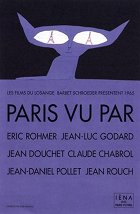Sinopses(1)
The young producer Barbet Schroeder had the idea of supplying a 16mm camera, along with colour film stock, to six filmmaker friends and of asking them to make a short film about a Parisian neighbourhood. The films are simple and original, freed up from all technical and economic constraints, shot on the hoof in quick, improvised takes and with live sound... such was the outcome of this experiment supported by Godard, Rohmer and Chabrol. (Les Films du Losange)
(mais)Críticas (1)
The gentlemen capture the genius loci of the capital of the Nouvelle Vague without the idyll of Paris, je t'aime, and seemingly just incidentally. It is similar to the way that someone perceives their surroundings when pursuing a particular goal. The longer-term goals of the individual stories’ characters are neither clear nor important. What’s important is the laconic point, which repeatedly brings to mind the endings of films by Eric Rohmer, whose contribution to Six in Paris paradoxically struck me as being the least Rohmer-esque (again dealing with moral responsibility, but with the protagonist being a bit taller and less clumsy, I would think this is secretly a Jacques Tati film). Most of the stories are based on antagonism: man and woman, experience and immaturity, foreign and local, noise and silence. The incompatibility of the opposites ends with a sudden change of the situation. We have to figure out for ourselves what will happen afterwards. The most easily recognised creative signatures are those of Chabrol (caustic ridiculing of the bourgeoisie), Rouch (the reactions of a quarrelling couple observed with the patience of an anthropologist) and Godard (rotating camera). Taken as a whole, Six in Paris is quite well balanced, but it doesn’t contain a segment bold enough to make me want to see it again. 75%
()

